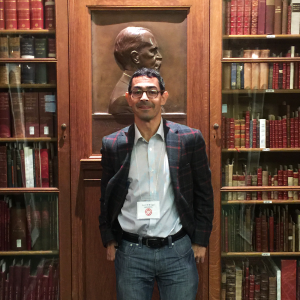Takeaway
Dr. Ronald Epstein's book, "Attending," offers insights into mindfulness and connecting with our patients.

Lifelong Learning in Clinical Excellence | September 20, 2018 | 2 min read
By Scott Wright, MD, Johns Hopkins Medicine
Medicine and mindfulness
For book club, a couple dozen physicians from the Johns Hopkins Miller Coulson Academy of Clinical Excellence were excited to pick up copies of Ronald Epstein’s Attending: Medicine, Mindfulness, and Humanity (2017) to read at their leisure over the summer. The theme of the book, as you can gather from the title, is mindfulness as a critical component of doctoring.
We met recently over a dinner of Greek chicken kebabs, dolmas, and baklava from a local family restaurant. After giving ourselves time to reconnect with each other after the summer, we opened our discussion on what we learned from our reading.
Here are a few takeaways that were brought to light:
Knowing your own early warning signs
Regular contributor Michael Crocetti’s main takeaway was on Epstein’s message on knowing your own signals for when you’re beginning to lose mindful presence. For Crocetti, when he notices that he stops smiling, it’s an indication to him that he needs to pause, breathe, and reset.
Making time for the non-medical
Geriatrician William Greenough, MD, shared that what helps him to be present when moving on to his next patient, is to simply either remember or ask something about the patient that is non-medical, in order to forge a deeper physician-patient relationship.
Opthamologist Sharon Solomon, MD, said that the way she remembers non-medical information about her patients is that she leaves herself notes and reminders in the EMR. These serve as a helpful reminders for follow-up questions about meaningful life events that transpired since the last visit.
Interesting title choice
Critiques of Attending included the title, which of course has many meanings. As one of the meanings of the word is that of the senior clinician, it may not hook pre-med or med students. However, the lessons in this book could be very helpful for those in any stage of their medical journey.
Another shared sentiment that a few of us noted and discussed, was that we actually feel guilty after being with a patient, when you realize that you weren’t as present as you might have been.
Closing thoughts
We brought the discussion to a close with concrete suggestions for each other on how exactly to bring mindfulness to our own practice, what we can each do on a busy day to maintain presence.
Crocetti offered the straightforward practice of taking one or two deep breaths before entering a new room to clear the mind. He also said, “I try to physically turn my whole body directly towards my patient and their family, to lean in to show them I’m listening closely.”
Nephrologist Duvuru Geetha had the final suggestion, another simple technique, which is spending the first few minutes of each patient visit without the EMR, simply two human beings connecting, making eye contact, and listening to each other.

